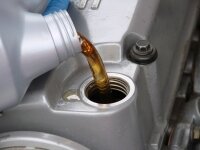Fake Lubricants Pervade Georgian Market
25 April, 2013
 The problem of fake lubricants that are pervading Georgian market since 2005, remains persistant; it affects consumers’ rights and the state budget alike. To overcome the problem, the Union of Oil Product Importers and Consumers of car oil importers held a confermec on April 17, 2013 summoning all interested sides including governmnet. All of them agreed on partnership.
The problem of fake lubricants that are pervading Georgian market since 2005, remains persistant; it affects consumers’ rights and the state budget alike. To overcome the problem, the Union of Oil Product Importers and Consumers of car oil importers held a confermec on April 17, 2013 summoning all interested sides including governmnet. All of them agreed on partnership.The problem of fake car oil/lubricants had been a permanent problem at Georgian market for years but it became acuter after 2005, when the mandatory certification of imported oil/lubricants was replaced by volunteer one under liberal reforms of the ex-power. On the other hand there are neither standards for the lubricant, quality in Georgia nor special state or non-governmental body monitoring the lubricants quality that eases life to dexterous falsifiers enjoying profits out of witty scheme: they adulterate branded lubricants by either secondary oil or the low quality oil designed for obsolete soviet techniques [like tractors] at car oil change units, fill the adulterated oil in tanks and boxes of famous brands including Aral, Castrol, Shell, TNK-BP etc and sell the faked oil as the first-hand branded product a bit cheaper than the original brand costs. For example this low quality lubricant that freezes at +1 degree Celsius and costs GEL 2-3 in fact can be sold for the price of the premium branded Aral costing GEL 100 per 4 liter tare. The profit is obvious. All sorts of oil including the premium, middle and low quality segments are faked, Vano Mtvralashvili, Head of the Union of Oil Product Importers and Consumers, said in the interview to Georgian Journal.
The fake oil affects the car engine as halves its exploitation period that infringes consumers’ interests and leads to unforeseen outlays. Often the falsifiers won even state tenders thus affecting the state car park and budget commensurately. Due to falsification sales of authorized brand importers reduced by at average 10-25% and the Union appealed to the previous government for help several times but the latter advised oil importer companies to solve the problem via court. Companies shunned the court for some reasons: some claimed it might be unreasonably costly, others said the falsifiers made of mainly petty entrepreneurs are hard to catch red-handed as they frequently change places. As a result the falsification only enhanced as statistics prove, Mtvralashvili assures. According to him, although Georgian car park is refreshed during last several years by famous German and Japanese branded-cars that use only high quality oil imported from EU and not the low-quality lubricants imported from Iran and Turkey and designed for soviet-time cars/technique, the import from Iran and Turkey overshadows the EU one.
“That is hardly possible for the new car park [made of German cars mainly] simply cannot use that oil, it goes on falsification most probably,” Mtvralasjvili elaborates. To solve the problem car oil importers ask government to adopt European standards first of all to specify which standard oil goes on what category and implement the market monitoring on the other hand.





















































